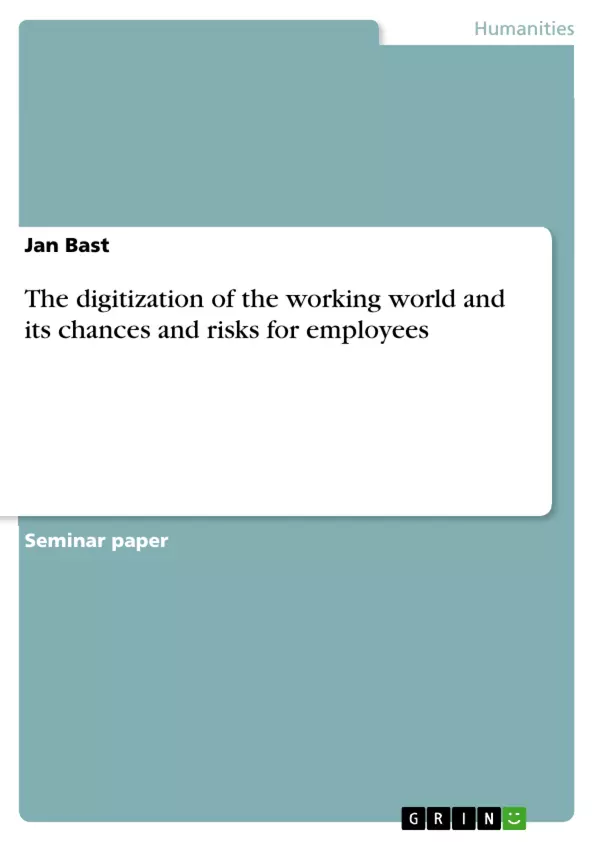The subject of this thesis is the investigation of digitization in the working world and its effects. In the following, it is important to take a closer look at the opportunities and risks of digitization and to examine their influence on companies more closely.
Particular attention is paid to employees and their needs. It should be worked out to what extent digitization influences their work and how companies can use digitization to respond to these needs. For this purpose, theoretical models are explained and possible influences are shown.
The world has changed a lot in the past few years and decades. Borders are disappearing, markets are growing and globalization is enabling global trade, leading to global competition. An end to this trend is not in sight. On the contrary, the world is becoming ever more complex and networked. More and more computing power, which is available in ever smaller chips, leads to an acceleration of change and transformation. Being able to adapt to these ever-changing framework conditions and master the associated challenges has become vital for companies.
Hardly any term shapes the professional and working world as much as "digitization". Their effects on the world of work are manifold. It influences automation, changes work processes, the way of communicating and enables completely new employment models. Topics on which there are many different opinions among experts and on which diverse discussions take place. This becomes particularly clear when looking at the result of a search query via Google. The term "digitization" delivers over 13 million hits.
Inhaltsverzeichnis (Table of Contents)
- 1. Introduction
- 1.1 Introduction
- 1.2 Objectives
- 1.3 Structure of the paper
- 2. Theoretical background:
- 2.1 Overview
- 2.1.1 Meaning of the term "digitisation"
- 2.1.2 Meaning of the term "Work 4.0"
- 2.1.3 Meaning of the term "Big Data"
- 2.2 Megatrends
- 2.2.1 Digitalization
- 2.2.2 Globalisation
- 2.3 Theories of need
- 2.4 Flexible working
- 2.5 Key questions
- 3 Methodology applied
- 3.1 Background of the article to be analyzed
- 3.2 The authors
- 3.3 Practice-oriented implementation
- 3.4 Definition of categories
- 4 Evaluation and results
- 4.1 Category 1 - "Macroeconomic aspects"
- 4.2 Category 2 - "Employee Aspects"
- 4.3 Category 3 - "Technical aspects"
- 5 Discussion
- 5.1 Quality criteria
- 5.2 Practical relevance
- 6. Conclusion
Zielsetzung und Themenschwerpunkte (Objectives and Key Themes)
This work investigates the digitization of the world of work and its effects, focusing on opportunities and risks of digitization, especially for employees and their needs. It aims to analyze how digitization influences their work and how companies can use it to respond to these needs. The objective is to create a recommendation for action for companies on how to approach digitization.
- The impact of digitization on the world of work and its implications for companies and employees.
- The opportunities and risks associated with digitization, particularly in relation to employee needs and well-being.
- The role of theoretical models and frameworks in understanding the effects of digitization.
- Practical recommendations for companies to address the challenges and opportunities of digitization in the workplace.
- The importance of flexible working practices in a digitized environment.
Zusammenfassung der Kapitel (Chapter Summaries)
The first chapter introduces the relevance of digitization and its significance in the modern world. Chapter 2 delves into the theoretical background of digitization, defining key terms like "digitization," "Work 4.0," and "Big Data," and exploring globalization and digitization as megatrends. It also examines theories of need and flexible working practices in relation to the impact of digitization on employees.
Chapter 3 outlines the methodology used in the analysis, including the background of the article being analyzed, the authors' perspectives, and the practical implementation of the research. Chapter 4 presents the evaluation and results, focusing on the three categories of "Macroeconomic aspects," "Employee Aspects," and "Technical aspects." The fifth chapter discusses the findings, considering quality criteria and practical relevance, while the conclusion chapter explores the importance of digitization for the world of work.
Schlüsselwörter (Keywords)
The primary keywords and focus topics of this work include digitization, Work 4.0, globalization, employee needs, flexible working practices, automation, opportunities and risks, theoretical models, practical recommendations, and the impact of digitization on the workplace.
Frequently Asked Questions
What are the main chances of digitization for employees?
Digitization enables flexible working models, automation of repetitive tasks, and better communication, which can lead to a better work-life balance.
What risks does digitization pose in the working world?
Risks include job displacement through automation, the pressure of constant availability, and the complexity of managing networked work processes.
What does the term "Work 4.0" mean?
Work 4.0 refers to the current era of work characterized by high levels of digitization, networking, and flexibility, following the industrial revolutions of the past.
How can companies respond to employee needs in a digital world?
Companies can use digital tools to offer flexible working hours, remote work options, and personalized training based on theoretical models of need.
What role does "Big Data" play in the workplace?
Big Data allows for better analysis of work processes and macroeconomic trends, helping companies to adapt to global competition more quickly.
- Quote paper
- Jan Bast (Author), 2018, The digitization of the working world and its chances and risks for employees, Munich, GRIN Verlag, https://www.grin.com/document/1185107



